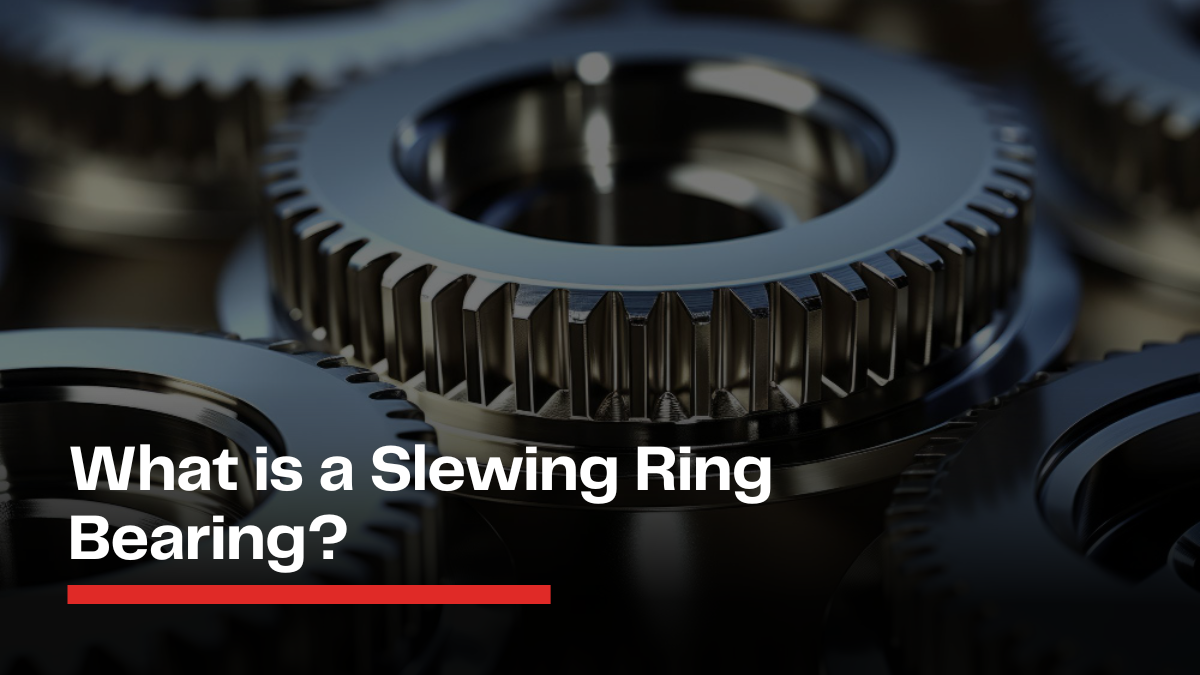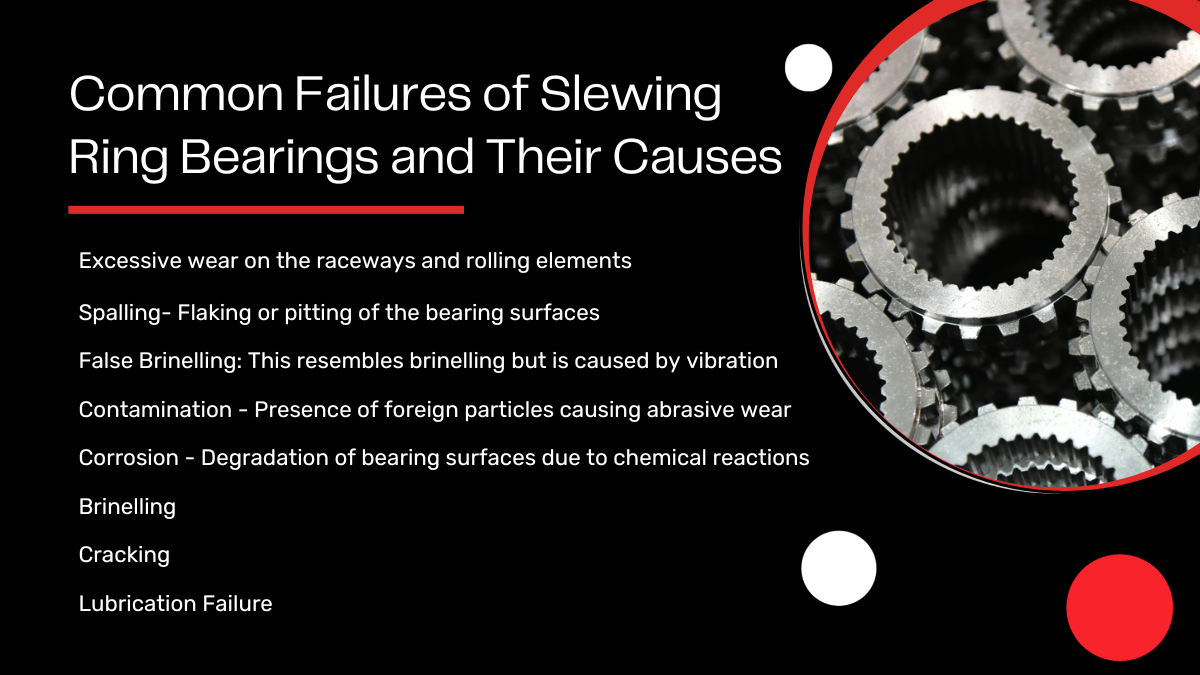Slewing ring bearings are essential components in heavy machinery, allowing rotation and support in various applications, from cranes to wind turbines. Despite their robust structure, slewing ring bearings are exposed to failures that can lead to expensive downtime and maintenance.
Understanding the causes of these failures and how to prevent them is crucial for securing the longevity and reliability of your machinery.
This blog explores the most regular slewing ring bearing failures, their causes, and best practices for prevention. But first, let's understand what Slewing Ring Bearing does.
What is a Slewing Ring Bearing?

A slewing ring bearing is a rotational rolling-element bearing designed to support heavy, slow-turning, or slow-oscillating loads commonly found in horizontal platforms like cranes or wind turbines. These bearings can manage axial, radial, and moment loads, enabling smooth and precise rotation of heavy machinery components.
Common Failures of Slewing Ring Bearings and Their Causes

Understanding the common causes of slewing ring bearing failures is crucial for controlling downtime and extending the equipment's life.
Here are the most common types of failures and their causes:
Excessive wear on the raceways and rolling elements
Wear and tear are natural consequences of continuous use over time. However, excessive wear can cause premature bearing failure and surface degradation on the raceways and rolling elements.
Causes:
- Inadequate lubrication: Leads to increased friction and metal-to-metal contact.
- Contamination: Entry of dirt, dust, or other particles accelerates abrasive wear.
- Misalignment: Uneven load distribution increases localized stress and wear.
Spalling- Flaking or pitting of the bearing surfaces
Spalling results from material fatigue, which causes fragments to break away from the bearing surface. This creates rough raceways, increased vibration, and noise.
Causes:
- Material fatigue: Repeated stress cycles over time weaken the material.
- Overloading: The bearing is subjected to loads beyond its designed capacity.
- Improper heat treatment: This leads to insufficient hardness and durability of the bearing material.
Brinelling
Excessive static or impact loads can lead to a condition known as brinelling, which manifests as indentations or permanent deformations on the raceways. The localized stress causes this type of damage and can significantly impact the performance and longevity of the affected components.
Causes:
- Excessive static loads: Prolonged heavy loads cause permanent deformations.
- Impact or shock loads: Sudden forces during installation or operation.
- Need for more support: Bearing housing or structure inadequately supports the bearing ring.
Corrosion - Degradation of bearing surfaces due to chemical reactions
Corrosion occurs when bearing surfaces react with moisture or chemicals, leading to surface pitting and weakened structural integrity.
Causes:
- Exposure to moisture/chemicals: Bearings in harsh environments are susceptible.
- Inadequate sealing: Allows moisture and contaminants to enter.
- Poor maintenance practices: Failure to protect bearings from corrosive elements.
Cracking
Severe stresses can cause cracks in the raceways or rolling elements, leading to visible cracks that compromise bearing integrity and performance.
Causes:
- Severe overloading: Forces beyond bearing capacity cause stress fractures.
- Material defects: Impurities or inconsistencies in bearing steel.
- Thermal stresses: Extreme temperature changes cause expansion and contraction stresses.
False Brinelling: This resembles brinelling but is caused by vibration
False brinelling appears as wear marks due to vibration and oscillation without full rotation, leading to fretting corrosion.
Causes:
- Vibration/oscillation: Occurs in stationary bearings subjected to vibration.
- Poorly fitted bearings: Looseness allows for micro-movement.
- Transport vibrations: Bearings vibrate during transport, causing fretting.
Contamination - Presence of foreign particles causing abrasive wear
Contamination within the bearing leads to the presence of foreign particles, causing abrasive wear and premature failure.
Causes:
- Inadequate sealing: Allows dirt, dust, and contaminants to enter.
- Contaminated lubricants: Lubricants mixed with foreign particles.
- Poor cleanliness: During installation or maintenance, contaminants are present.
Lubrication Failure
Lubrication failure results in inadequate lubrication film, causing increased friction, heat generation, and wear.
Causes:
- Incorrect lubricants: Using unsuitable or low-quality lubricants.
- Inadequate lubrication intervals: Need more re-lubrication or maintenance.
- Environmental factors: Conditions that degrade lubricant performance (e.g., temperature extremes).
Implementing Preventive Measures
Executing preventive measures can significantly reduce slewing ring bearing failures. Regular inspections, appropriate lubrication, adequate sealing, proper load management, and adherence to installation guidelines are crucial for maintaining the longevity and performance of slewing ring bearings.
Understanding these failure types and their causes allows for proactive maintenance and helps ensure reliable operation in heavy machinery applications.
Final Words
Businesses can significantly reduce the risk of bearing failures and associated downtime by addressing misalignment, inadequate lubrication, contamination, overloading, and improper installation.
You must prioritize regular maintenance, inspections, and monitoring using advanced technologies to detect potential problems early on.
Also, proper personnel training, adherence to load limits, and adequate lubrication management are critical in preventing bearing failures.
Consider partnering with Unimacts for comprehensive solutions and support in maintaining the optimal performance of slewing ring bearings. With their expertise and industry-leading services, Unimacts can help businesses implement unified preventive measures and ensure the smooth operation of their equipment.
Contact Unimacts today to learn more about their offerings and how they can support your maintenance needs.


